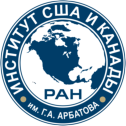
On March 30, 2020, under the auspices of ISCRAN and the US National Academy of Sciences, an international scientific seminar was held on topical issues of the arms control regime. Initially, this seminar was planned in person, but due to emergency measures taken by the governments of all countries to curb the spread of COVID19, it was transferred to the digital video format.
The seminar was moderated on the Russian side by academician of the Russian Academy of Sciences S. Rogov, scientific supervisor of ISCRAN, and on the American side by Linton Brooks, senior adviser to the Center for Strategic and International Studies (CSIS), head of the American delegation at the negotiations on the START-1 treaty.
On the Russian side, the seminar was attended by leading experts and experts in the field of international security from research institutes and independent expert centers, as well as representatives of government agencies:
Yesin V. I., Leading Researcher, ISCRAN, former Chief of the Main Staff of the Strategic Missile Forces, Ph.D., retired Colonel General;
P. Zolotarev, ISCRAN Leading Researcher, Ph.D., retired Major General;
Kuznetsov V. S., ISCRAN Senior Researcher, former Chief Military Representative of the Russian Federation to NATO, retired Vice Admiral;
Yumasheva I. A., member of the State Duma Committee on International Affairs (United Russia);
Buzhinsky E.P., Chairman of the PIR Center Council, Vice-President of the INF Treaty, Candidate of Military Sciences, Retired Lieutenant General;
Voitolovsky F. G., Director of IMEMO RAS, Corresponding Member of RAS, Doctor of Political Sciences;
Zinchenko A.V., Leading Expert, Center for International Information Security and Scientific and Technological Policy, Doctor of Historical Sciences;
V. Kozyulin, project director for new technologies and international security of the PIR Center;
Krivolapov O. O., Researcher ISCRAN, Candidate of Political Science;
Romashkina N.P., corresponding member AVN RF, candidate of political sciences, professor, head of the Information Security Problems Group, IMEMO RAS;
Ryzhikh Yu. K., independent expert, former head of the automated control systems department of the Strategic Missile Forces General Staff, retired colonel;
Seleznev S.P., Ph.D., Corresponding Member of IAS IPT, retired colonel, former deputy head of the Department of Information Technology, 27 Central Research Institute of the Moscow Region;
Shakirov O. I., PIR Center Consultant;
Sharikov P. A., Leading Researcher, Department of Military-Political Studies, ISCRAN, Candidate of Political Sciences;
Sokolova P., representative of IB-group;
Stefanovich D.V., independent expert, expert at the INF Treaty;
Stepanova N.V., Researcher, Department of Military-Political Studies, ISCRAN;
Streltsov A. A., Head of Department, Institute for Information Security Problems, Moscow State University M.V. Lomonosov.
From the American side, the seminar was attended by:
Diana Arsenyan, Vice President, International Programs, Carnegie Corporation;
Matthew Bunn, Leading Researcher at the School of Management. J. F. Kennedy, Harvard University, Belfer Center for Science and International Relations, organizer of the atomic control project at Harvard University; Leading US Specialist in Nuclear Weapons and Dangers;
Richard Garwin, Emeritus Professor, IBM Corporation, Thomas J. Watson Research Center;
Rose Gottemoeller, NATO Deputy Secretary General (2016-2019), US Assistant Secretary of State for Arms Control and International Security, head of the American delegation to the negotiations on START-3;
Rita Gunter, Program Manager, Department of Political and Global Affairs, US National Academy of Sciences;
Robert Latiff, Retired Major General; Private Advisor on Advanced Technology;
Professor, George Mason University; Carl Robisho, International Peace and Security Program Officer, Carnegie Corporation
Corporation of New York);
James Timby, Honorary Guest Officer of the Annenberg Program, Hoover Institute, Stanford University;
Member of the US National Academy of Sciences’s Committee for International Security and Arms Control [CISAC], former senior specialist at the Department of State closely associated with arms control agreements (1983-2016) .;
David Franz, former commander of the Army Research Institute of Infectious Diseases, member of the Council for Integrated Nanotechnology;
Stephen Fetter, professor of public policy at the University of Maryland, former assistant to the president of the United States for science and technology;
Jill Khruby, NTI Researcher, Former Director of Sandia National Laboratories
During the seminar, a comprehensive assessment was made of the impact of the COVID19 coronavirus pandemic on the processes occurring in world politics, the main focus of the seminar was on discussing the extension of the START-3 treaty, new directions for Russian-American cooperation in the light of the pandemic that swept the world were proposed.
Seminar participants noted the benefits of such a format for holding expert meetings and agreed to organize them on a regular basis.
Workshop video is available at https://drive.google.com/open?id=1KCqm5HOvTGIB0FB3FPhLiAPQTaDWhmNZ
